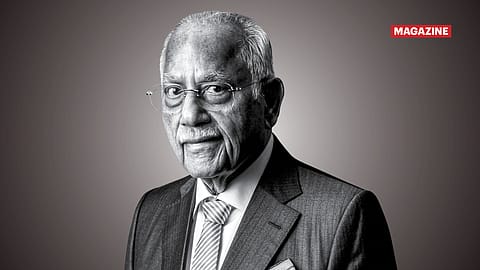Apollo Hospitals’ Prathap C. Reddy: India will drive the next global healthcare revolution
Apollo Hospitals’ Prathap C. Reddy on building a healthcare system in India that nurtures, and not just heals.

This story belongs to the Fortune India Magazine august-2025-india-s-top-100-billionaires issue.
INDIA’S HEALTHCARE SECTOR has seen remarkable progress over the past four decades across medical technology, infrastructure, and access. Advanced treatments that were once out of reach are now a reality for many Indians. As the system matures, it’s time to re-examine its core purpose — not just to alleviate suffering, but to actively restore health and vitality.
With today’s advances in medical science, digital tools, and delivery systems, this transition is not only essential — it is entirely achievable. This calls for a fundamental shift in India’s healthcare approach: from reactive, disease-centric treatment to a proactive, preventive, and wellness-oriented model.
The case for preventive healthcare
Non-communicable diseases such as cardiovascular conditions, diabetes, and hypertension are now responsible for approximately 60% of all deaths in India. The Apollo Hospitals Health of Nation 2025 Study, based on screenings of over 2.5 million individuals, highlights a troubling trend: 26% had undiagnosed hypertension, and nearly half showed early markers of cardiac disease, all often without symptoms.
These silent conditions are largely preventable through timely lifestyle modifications, early detection, and structured health education. Yet, preventive care continues to remain underfunded and overlooked.
To address this lacuna, there is a need for a science-backed, clinical expertise and preventive care programme to identify risks early, which could offer personalised interventions, and track wellness over time. As prevention takes precedence, doctors can dedicate more time and expertise to managing complex and critical illnesses that require specialised care.
Integrating empathy with innovation
More Stories from this Issue
While technology is reshaping healthcare delivery, it cannot replace the human connection at the heart of medicine. Doctors play a vital role not just in diagnosis and treatment, but in listening, educating, and empowering patients. Studies have shown that empathy significantly enhances treatment adherence and outcomes.
Healthcare must evolve into a collaborative partnership between doctors and patients, built on mutual trust. Moving from transactional interactions to personalised, long-term relationships will not only enhance patient engagement but will also accelerate preventive behaviours and support more data-led decision-making.
Bridging access disparities
Despite major advancements, disparities in healthcare access persist, particularly between urban and rural India. While metros boast world-class care, millions in underserved regions still lack even basic access.
(INR CR)
Innovative approaches like telehealth, mobile clinics, and community health worker models have shown promising results in expanding care reach. Public-private partnerships, if structured effectively, can extend the reach of government programmes with private-led innovation.
Systems-based approach
Health education must start young, instilling habits that last a lifetime. Personalised care, powered by genomics and digital health records, must become the norm. Social determinants — income, housing, and education — must be addressed through integrated policy efforts. Clean air, safe water, and secure housing are as critical as any medical intervention and should be embedded in the governance approach. Doctors, as trusted leaders in their communities, are central to this transformation.
Proactive, equitable future
Today, India is a global healthcare destination and can address the international shortfall of healthcare professionals. This has been realised through the ministry of health and family welfare’s ‘Heal in India’ and ‘Heal by India’ initiatives, which are supported by streamlined policies and strengthened public-private collaboration.
With a strong clinical talent pool, advancements in technology, and growing health awareness, today, India is uniquely positioned to lead the global healthcare transformation. As we march towards the vision of Viksit Bharat, building a developed, inclusive, and healthy nation by 2047, rethinking our healthcare priorities is not optional — it’s essential.
In the month of the country’s 79th Independence Day, as a medical practitioner, I envision an India where every citizen can lead a healthier, happier, and more productive life.
(Views are personal. The author is founder & chairman, Apollo Hospitals Enterprise)